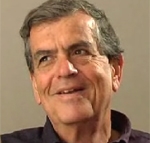-
Videos
- Video Interviews with Scientists
- Nobel Prize Video Interviews
- Issues of Concern
- Science Video Lectures
- Reflections on Science Videos
- Masterclass Science Videos
- Science Career Videos
- Lindau 2003 Documentary
- The Next Big Thing Science Videos
- Science Video Research Projects
- Educational Resources
- Documentaries
- Art & Science Videos
- STFC Video Portal
- Women in Science
- You are here >
- Home
- Programmes
- Nobel Prize Video Interviews
- Aaron Ciechanover - Science Video Interview
A video interview recorded in 2006 with Aaron Ciechanover who shared the Nobel Prize for Chemistry in 2004 for the discovery of ubiquitin-mediated degradation.
The interview starts with Ciechanover discussing his father - a very well educated man who eventually became a lawyer. Ciechanover said that he grew up on books. His brother also became a lawyer and he says that he was a kind of a black sheep as instead he went into science. He tells us that this did not matter at all - all that mattered was studying. He says that he is a citizen of the world and that this started at home with studying a wide range of subjects, culture, languages, mathematics and religion. As a kid he was into nature and used books to dry his collection of plants. When this was discovered his father and brother thought this was outrageous - a failure of education. He was seven years old.
His parents worked very hard and put everything into his and his brother`s education. They emigrated to Israel in the late 1920`s and then did not travel abroad. He says that he had no limit on the amount of books that he wanted.
Ciechanover tells us that he is enormously involved with the tradition of Judaism. For him Judaism is a culture and he does not believe in the supernatural. He does not believe in a god or an afterlife - he says that is going too far. He says that our greatest treasure in the world is our diversity and our self identity makes for a diverse world. He says that his background was very liberal and he had an interest in science from day one, particularly biology and chemistry. He feels best somewhere in biology as this is where he feels most comfortable.
He talks about the work for which he obtained the Nobel Prize. He got into this work through his mentor and teacher. He looked very hard for the right mentor and he says the direction he followed was 80% due to curiosity. By 1979 he knew that they were on to something new.
He describes his live before and after the prize. He says that he does not work hard but he works a lot and laments the fact that he does not have enough time to read or take in culture. He visits exhibitions only when he travels. He says that his laboratory is still his first and foremost love.
He is interested in educating young children and reflecting on how to improve the problems of the world such as poverty and inequality.
He says that he has an interesting life; he enjoys culture randomly on his trips to cities. Ciechanover says that he will never run out of interests or things to do as he has enough books waiting to be read to carry him beyond his life.
Links To Other Information:Link to information on the Nobelprize website








